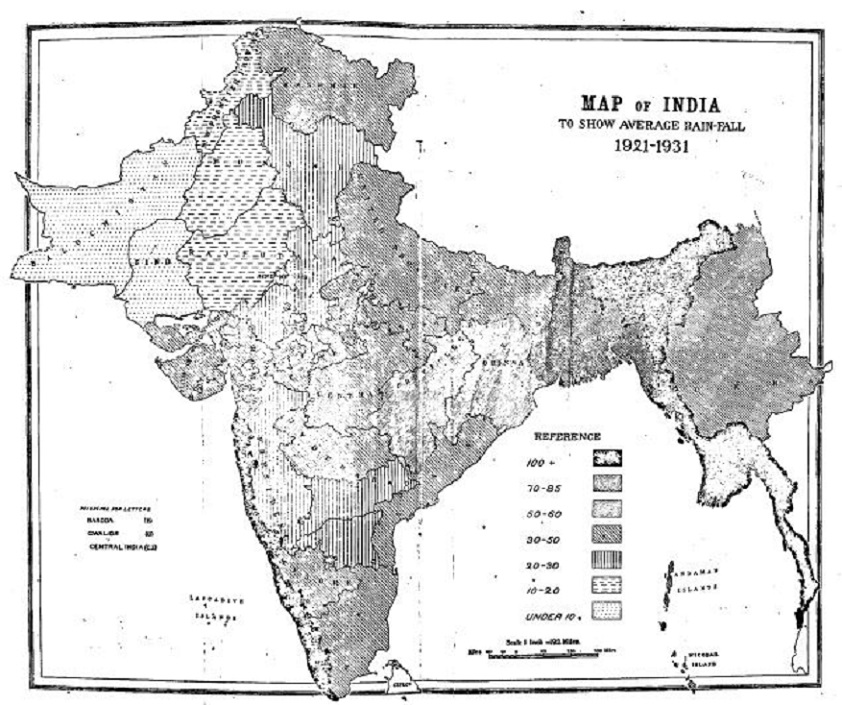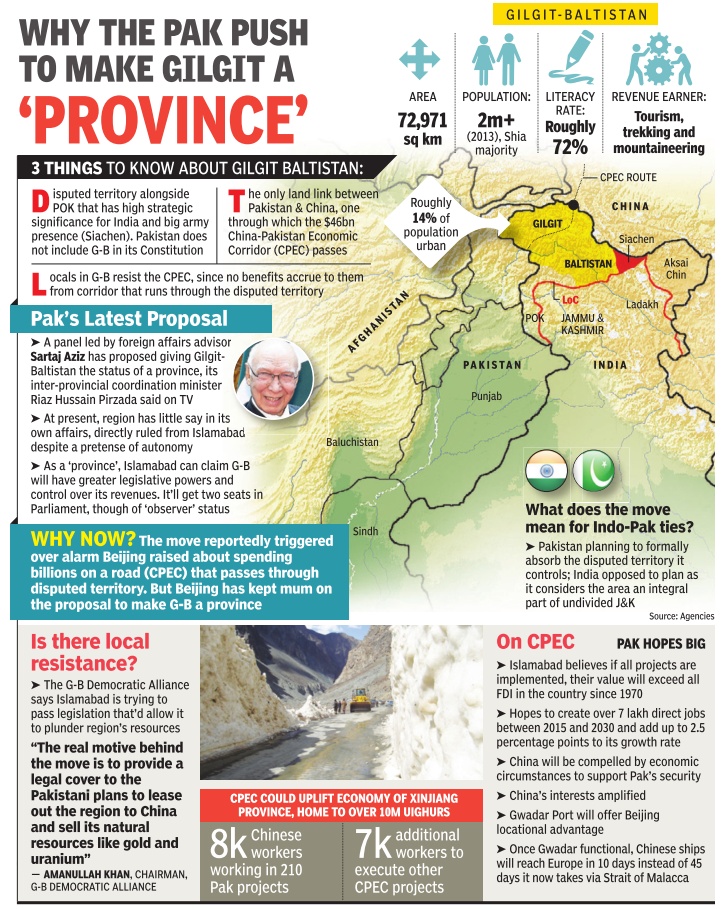Gilgit-Baltistan
This is a collection of articles archived for the excellence of their content. Readers will be able to edit existing articles and post new articles directly |
Contents |
Constitutional status

Thousands of pre- 1947 maps of India, lying in the archives of Pakistan, Gilgit- Baltistan and neutral online archives say otherwise.
This, for instance, is a map of India, showing the average rainfall in India 1921-31. It has been taken from the opening pages of the Census of India, 1931, Vol. I INDIA Part 1-Report
See graphic, '...Map of India, showing the average rainfall in India, 1921-31. It has been taken from the opening pages of the Census of India, 1931, Vol. I INDIA Part 1-Report'
British view: Gilgit-Baltistan part of J&K
HIGHLIGHTS
Resolution passed in British Parliament said Gilgit-Baltistan a legal and constitutional part of J&K
House condemns Islamabad's announcement declaring Gilgit-Baltistan as its fifth province
People in the region 'are denied their fundamental rights,' resolution says
LONDON: A motion was tabled in the British Parliament condemning Islamabad's announcement+ declaring Gilgit-Baltistan as its fifth frontier+ , saying the region is a legal and constitutional part of Jammu & Kashmir illegally occupied by Pakistan since 1947.
The motion which was tabled on March 23 and sponsored by Conservative Party leader Bob Blackman, stated that Pakistan, by making such an announcement, is implying its attempt to annex the already disputed area. "Gilgit-Baltistan is a legal and constitutional part of the state of Jammu & Kashmir, India, which is illegally occupied by Pakistan since 1947, and where people are denied their fundamental rights including the right of freedom of expression," the motion read.
It was further noted that the attempts to change the demography of the region was in violation of State Subject Ordinance and the 'forced and illegal construction' of the China-Pakistan Economic Corridor+ (CPEC) further aggravated and interfered with the disputed territory . Meanwhile, a spokesperson for the Chinese foreign affairs ministry has said that Beijing was ready to work with Islamabad to take forward the CPEC to benefit the people of both countries.
The economic corridor is a $51.5 billion project that aims to connect Kashgar, in China's western province of Xinjiang, with the port of Gwadar+ in the Pakistani province of Balochistan.
Pakistani attempts to merge Gilgit-Baltistan as a province
The reasons why

See 'Why Pakistani wants to merge Gilgit-Baltistan as a province'
The Government of Gilgit-Baltisan order 2009
THE federation of Pakistan comprises four provinces and four non-provincial units, namely Fata, Northern Areas, which is now Gilgit-Baltistan, Azad Jammu and Kashmir and the Islamabad Capital Territory. The people of Gilgit-Baltistan have been living in a constitutional vacuum for over 64 years. They are neither given representation in the parliament nor a constitutional mandate to the local assembly.
In August 2009, an ad hoc ordinance was introduced by the government of Pakistan called Gilgit-Baltistan Empowerment and Self-governance Order. The Pakistan People’s Party called it a democratic change in Gilgit-Baltistan. I accept that names have been changed: executive to governor and deputy executive to chief minister, Northern Areas to Gilgit-Baltistan. We can’t complain much about that. There is no doubt that ministers have been increased but the budget is the same.
It was a matter of celebration for the people of Gilgit-Baltistan that they are going to have their own governor and chief minister, and that Gilgit-Baltistan has been given the status of so-called province. But, in fact, nothing has been changed at grassroots level. There is no status of a province, no representation either in parliament.
We are neither given any administrative setup like Azad Jammu and Kashmir nor facilities which other provinces enjoy.
This arrangement, on the other hand, increases the confusion of the local people in order to explain the future status of the area and raises numerous questions. Will a citizen of Gilgit-Baltistan be able to be a chief justice in courts of Pakistan including the Supreme Court? Will a citizen of Gilgit-Baltistan be able to be a general in the Pakistan army? Will it be written in syllabus that Pakistan has five provinces?
Three years have passed while the area did not get part in the NFC award, separate quota in competitive examinations and seats in various universities of Pakistan.
Since 1947 the constitutional and administrative status and fundamental human and political rights of the people of Gilgit-Baltistan have been discussed between governments of Pakistan and India. The constitutions of 1956, 1962 and 1973 of Pakistan do not recognise Gilgit-Baltistan as part of Pakistan.
It is clearly explained that Gilgit-Baltistan is not part of Pakistan in term of Article 1 of the Constitution of Pakistan which spells out territorial limits of the country. But democratic and military dictators introduced various governance reforms in the area under different names in order to align it with the emerging economics and political needs of the country.
Now, it is indeed required to clear the ambiguity over Gilgit-Baltistan. Pakistan must change the bureaucratic government in Gilgit-Baltistan and empower the legislative assembly, strengthening its institutional capacity to work for the people rather than for bureaucrats and politicians.
2014/ Amendment- The Government of Gilgit-Baltisan order 2009
President Mamnoon Hussain, on the advice of the Prime Minister, has approved the proposed amendments in Gilgit-Baltistan (Empowerment and Self-Governance) Order, 2009.
The summary for the proposed amendments was initiated by the Ministry of Kashmir Affairs and Gilgit-Baltistan.
Following is the text of the Order, "S.R.O--- (1)/2014- In exercise of the power conferred by Article 93 of the Gilgit-Baltistan (Empowerment and Self-Governance) Order, 2009, the Government of Pakistan is pleased to direct that the following amendments shall be made in the aforesaid order, namely:-In the aforesaid order,
a) in Article 33, for clause(10), the following shall be substituted, namely:-
"(10) an elected member shall hold office for a term of five years from the day he enters upon his office";
b) In Article 35, after clause (4), the following new clause shall be inserted namely;-
"(5) on dissolution of Assembly on completion of its term, or in case it is dissolved under Article 41, the Chairman of the council shall appoint a caretaker Cabinet:
Provided that the caretaker Chief Minister shall be selected by the Chairman of the Council in consultation with the Chief Minister, the Leader of the Opposition in the outgoing Assembly and the Minister for Kashmir Affairs and Gilgit-Baltistan;
Provided further that the Members of the Caretaker Cabinet shall be appointed on the advice of the caretaker Chief Minister:
Provided also that if the Chief Minister, the leader of the Opposition in the outgoing Assembly and Minister for Kashmir Affairs and Gilgit-Baltistan do not agree on any person to be appointed as care-taker Chief Minister, the Chairman of the Council may appoint, in his discretion, a care-taker Chief Minister," and
(c) In Article 41, after clause (2), the following new clause shall be inserted, namely:-
"(3) Notwithstanding anything in the Order, if at any time it is not possible for any reason to hold general election to the Assembly, the Government of Pakistan may postpone the election for a period not exceeding ninety days at a time."